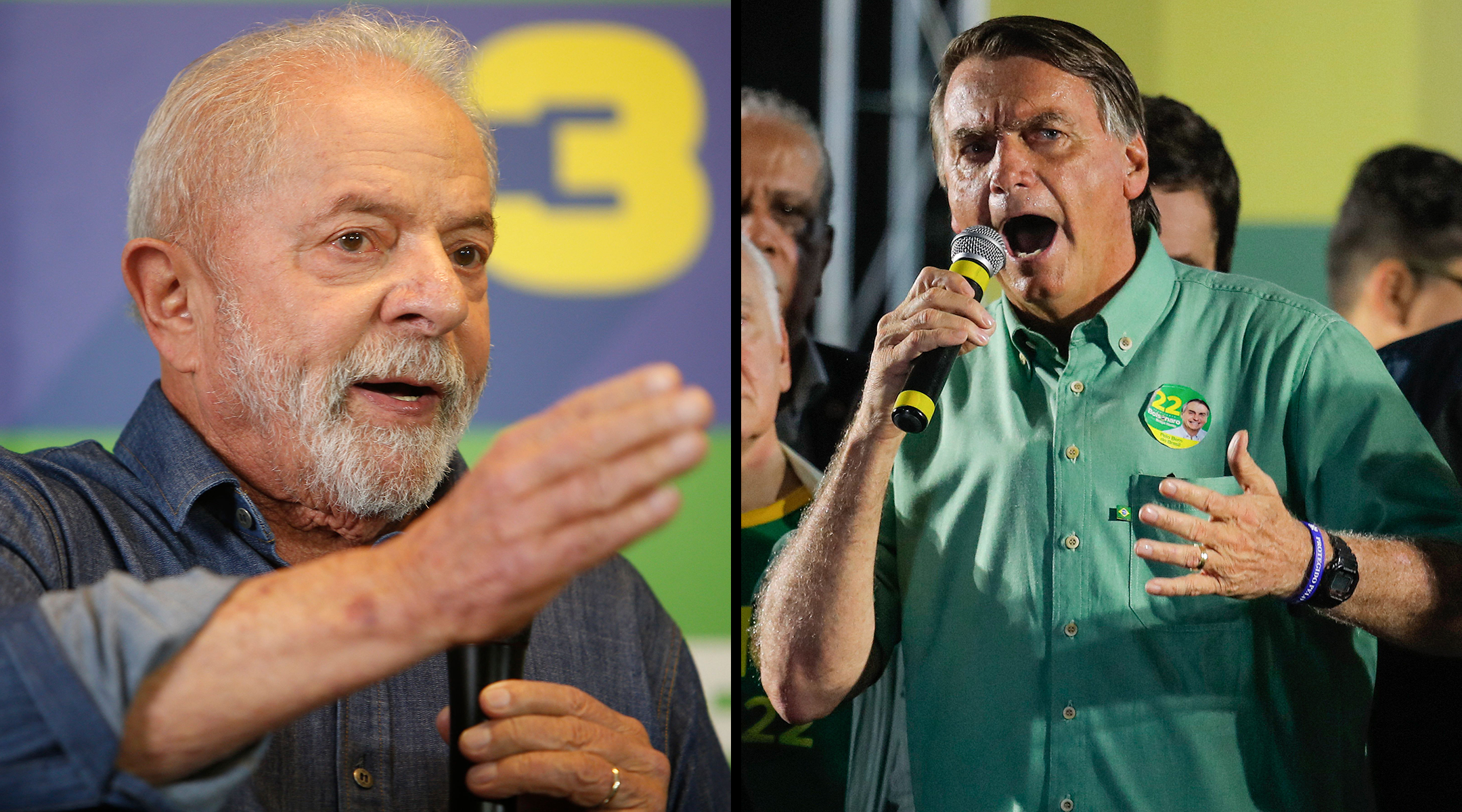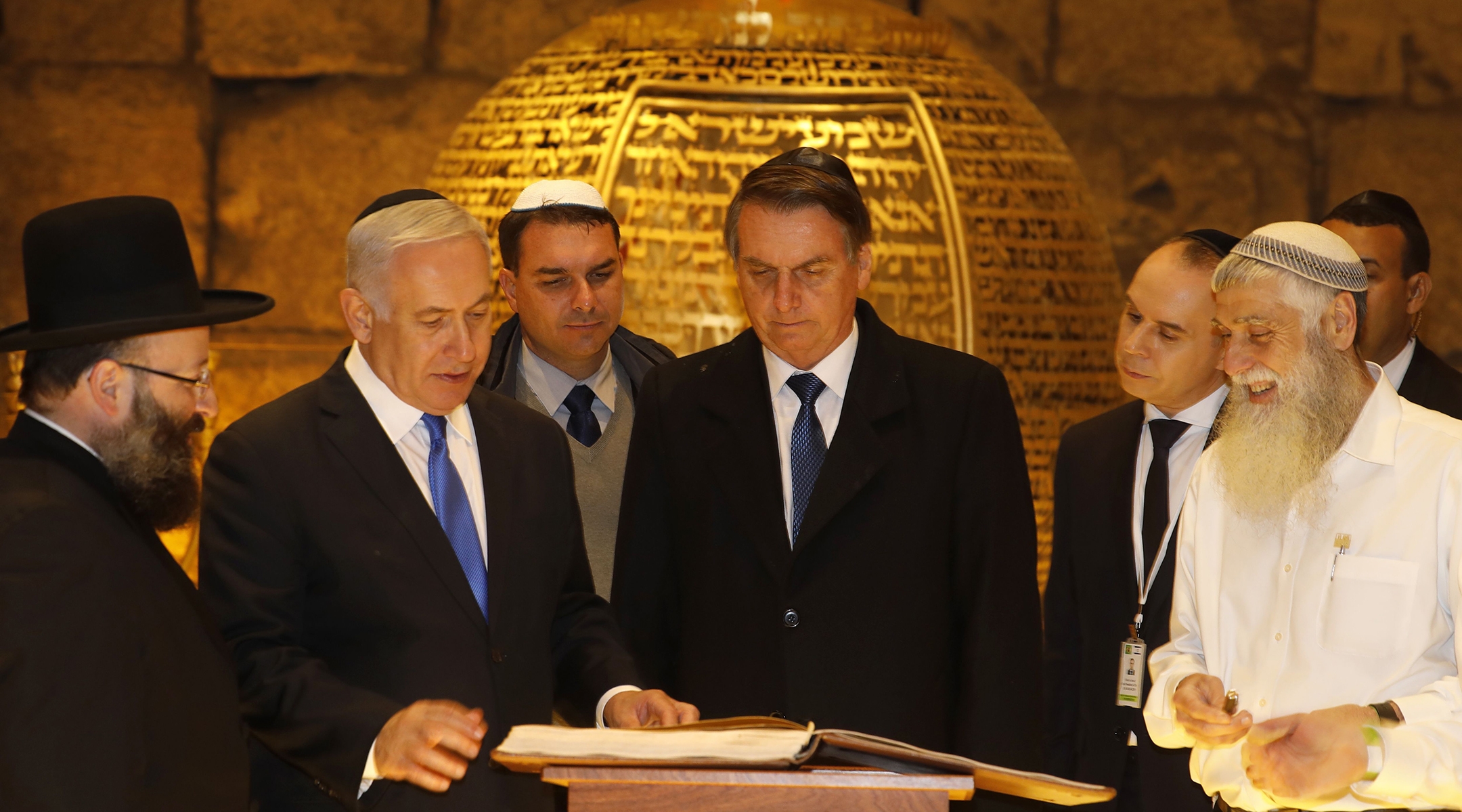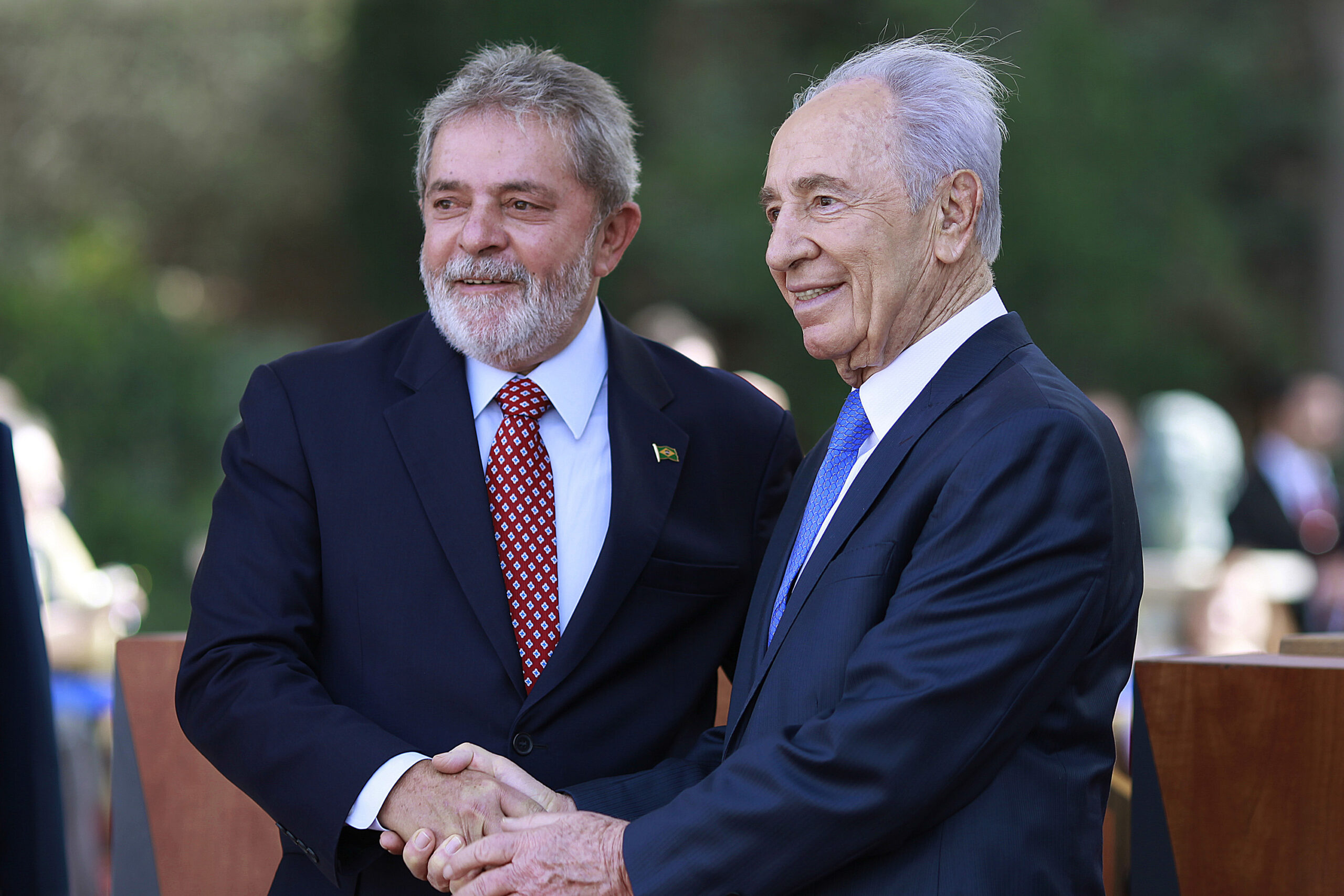In Brazil’s presidential election, many Jews feel like they are choosing ‘between the cross and the sword’
The Christian nationalist Jair Bolsonaro and the leftist former president who served jail time have different views on Israel but both pose quandaries for Brazil’s polarized Jewish population

Brazilian President Jair Bolsonaro, right, and presidential candidate for the leftist Workers Party, Luiz Inacio Lula da Silva, left, and Brazilian President and re-election candidate Jair Bolsonaro, right, are fighting for the next presidency. (Getty Images)
RIO DE JANEIRO (JTA) — When Brazilian soccer legend Neymar recently declared his support for far-right President Jair Bolsonaro’s reelection, he was bombarded with messages of both love and hate on social media. The same thing happened to pop star Anitta, who earlier this year became the first Brazilian to top Spotify’s global chart, when she announced she’s cheering for leftist ex-President Luis Inacio Lula da Silva, commonly known as Lula.
While both of those non-Jewish icons didn’t mind riling up their combined quarter of a billion Instagram followers, Brazilian Jewish organizational leaders have taken a completely different approach, hiding their preferences between the country’s two remaining presidential candidates, who are both popular but controversial.
These leaders fear adding more fuel to the fire raging within their 120,000-strong community, which, like most of the rest of the country, is highly polarized in the aftermath of Bolsonaro’s tumultuous first term.
But many Brazilian Jews, a highly-educated group that largely skews middle to upper class, also feel stuck in the middle of the two poles, wanting a stable leader to improve everyday conditions who is also strongly pro-Israel. Bolsonaro and da Silva seem to fall outside of the middle of their desired Venn diagrams.
“My candidate isn’t perfect, but he beats the alternative. I feel like my Sephardic ancestors who had to choose between the cross and the sword,” said psychologist Luciana Levy, in a reference to Portuguese Jews who were forced to choose between converting to Christianity or death during the Inquisition. She would not reveal her preferred candidate.
Choosing between Bolsonaro and da Silva in a final round on Sunday is certainly a choice between two wildly different worldviews and sets of policies. Neither received over 50% of the national vote on Oct. 2 — 48% for da Silva, 43% for Bolsonaro — forcing a runoff. Bolsonaro was predicted to fall further behind da Silva than he did; one poll has them now statistically tied.
“Now we must choose between the devil and the demon,” Levy added.
Bolsonaro’s Jewish record
Bolsonaro, 67, is a retired military officer and fervently Christian nationalist who rode a sudden populist surge to a presidential victory in 2018 in a way that many observers compared to Donald Trump. The “Tropical Trump,” as the former U.S. president calls him, has become known for his inflammatory statements during and before his time in office, such as saying he would rather have a dead son than a gay one and likening descendants of Black slaves to animals. He was caught on camera telling a female politician that he wouldn’t rape her because she was not worthy of it.
Bolsonaro also presided over one of the world’s most calamitous reactions to the COVID-19 pandemic, calling the virus “a little flu” and delaying vaccine purchases as Brazil’s death toll skyrocketed (its official toll now stands above 687,000 people, second only to the United States). He has allowed deforestation of the Amazon to hit its highest level in over a decade.
But many Jews have taken note of how Bolsonaro has been historically close with Israel for a Brazilian leader. He boosted his relations with the Brazilian Jewish community in April 2017, when the then-congressman was invited to speak at Rio’s Hebraica club, a hub of sport and cultural activities founded in 1957 by European Jewish immigrants.

Brazilian President Jair Bolsonaro, center. listens to then Israeli Prime Minister Benjamin Netanyahu, left, during a visit to a synagogue inside the Western Wall Tunnels in Jerusalem’s Old City, April 1, 2019. (Menahem Kahana/ POOL / AFP)
“My heart is green, yellow, blue and white,” he said in a reference to the Israeli and Brazilian flags, earning applause inside (and a protest outside the building) as he hailed the Jewish state for its power and social welfare system, saying it should inspire Latin America’s largest nation.
As president, Bolsonaro was fast friends with Israeli Prime Minister Benjamin Netanyahu, who became the first sitting Israeli prime minister to visit Brazil when he attended Bolsonaro’s inauguration on Jan. 1, 2019. During the trip, the pair went to a Rio synagogue, where Bolsonaro was feted like a king, and Bolsonaro reiterated his campaign promise to transfer the Brazilian embassy from Tel Aviv to Jerusalem. (A year after, Brazil opened a new trade office in Jerusalem as a first step to an embassy move, which has not yet happened.)
After only three months in power, Bolsonaro paid an official visit to Israel, where he spoke Hebrew upon his arrival at Ben Gurion airport and made a historic visit to the Western Wall with Netanyahu.
But back home, Bolsonaro has repeatedly raised Jews’ eyebrows. In 2019, following his visit to the Yad Vashem Holocaust memorial in Jerusalem, Bolsonaro declared that Nazism was a leftist movement. Two weeks later, he said that the crimes of the Holocaust can be forgiven.
In 2020, he employed a bizarre slogan about combating the coronavirus which recalled the infamous Nazi inscription at the entrance to the Auschwitz concentration camp: “Arbeit macht frei,” or “work will set you free.” And in 2021, he welcomed Beatrix von Storch, a far-right German lawmaker whose grandfather was Hitler’s finance minister, on an official visit that was slammed by several Jewish groups.
For Jews wary of years of anti-Zionist leaders, rampant government corruption and past freedom of speech crackdowns, Bolsonaro has been a refreshing change.
“During Bolsonaro’s government, Brazilian democracy wasn’t threatened, not even once. There was no persecution of political opponents, no newspaper closures, no censorship of any kind. It’s quite the opposite, we enjoy full freedom at all times,” said Leandro Spett, a Jewish illustrator, cartoonist and caricaturist who lives in Sao Paulo. He was one of the organizers of an Abrahamic Hummus Championship last month, a festive get-together of Jews and Arabs at the Hebraica club. “For us Jews, it is a fundamental condition for our existence and coexistence with our neighbors of other faiths and religions.”
Bolsonaro’s far-right stances and rhetoric have shocked and alienated others, who argue his government does not prioritize minorities and have even compared him to Hitler. Gaavah, a liberal LGBTQ Jewish group with 70 members and bases in five cities, compared Bolsonaro to a neo-Nazi in a manifesto on the election published last weekend. Andre Liberman, a 22-year-old coordinator for the group, said Bolsonaro “breaks our Jewish values and disrespects our Brazilian law.”
“Even before he took power, Bolsonaro already had an authoritarian speech and attitude. In his political campaign, he said that minorities must kneel down before the majority,” said Diana Sichel, a Rio school teacher who is a former member of the leftist Zionist Hashomer Hatzair Jewish youth movement. “In a democracy, the majority embraces all minorities. We Jews are a minority. It all starts with a speech. Just like in ‘Mein Kampf.’”
Da Silva’s Jewish record
Da Silva is equally as popular on the left as Bolsonaro is on the right — despite the fact that the former president has served 580 days in prison.
A former union organizer turned longtime democratic socialist politician, da Silva was president of Brazil from 2003 to 2010, during which he enacted ambitious social programs — such as an economic movement to tackle income inequality nicknamed “Lulism” — and prioritized foreign policy.
But his tenure was plagued by scandal. In 2017, he was convicted of corruption and money laundering — which he denied — and was sent to jail. Da Silva also tried to enact a press law calling for changes to rules governing journalists that some feared would begin a slow reversion to an era of dictatorship. He additionally supported dictatorial regimes around the world in countries such as Cuba, Venezuela, Syria, Libya and several African nations.
The governments of da Silva and his political goddaughter Dilma Rousseff — who succeeded him as president but was eventually removed from office for manipulating the budget — faced continual hiccups and controversies in regards to Israel, leading to confrontation with the local Jewish community.
In 2009, da Silva warmly welcomed former Iranian President Mahmoud Ahmadinejad, a notorious Holocaust denier whose regime persecuted minorities and critics, for a visit that drew international criticism.

Former Brazilian President Luiz Inacio Lula Da Silvia, left, attends an official welcoming ceremony with then Israeli President Shimon Peres, right, in Jerusalem, March 15, 2009. (Ricardo Stuckert/PR/Latincontent/Getty Images)
During his first official visit to Israel in 2010, da Silva refused to visit Theodor Herzl’s grave, which was part of the itinerary for visiting foreign officials in honor of the 150th anniversary of the father of Zionism. Days after, he laid a wreath at Yasser Arafat’s grave in Ramallah. In the final month of his administration, his government officially recognized Palestine as a state.
Under Rousseff, Palestinian leaders inaugurated an embassy in Brazil, their first in the Western Hemisphere. Her government fomented a diplomatic crisis with Israel in 2015 for rejecting Jerusalem’s right-wing choice for ambassador in Brasilia. Some say that she was retaliating for being called a “diplomatic dwarf” by a senior Israeli diplomat a year earlier, after the South American nation recalled its ambassador from Tel Aviv to protest Israel’s attack on Hamas during that summer’s Gaza war.
“When Bolsonaro sees signs of neo-Nazi sympathizers to his conservative speech, he knows very well how to drive them away,” argued Flavio Stanger, a former president of Rio Jewish federation board of councilors. “His opponent, on the other hand, is lenient with the radicals of the extreme left, including Palestinian officials and terrorist groups, which means being against the Jews.”
Jayme Fucs, a Rio-born longtime Jewish far-left activist who left to settle in an Israeli kibbutz 40 years ago, made headlines in Brazil for visiting da Silva in jail in 2018. On the eve of Yom Kippur, wearing a yarmulke and tallit, Fucs, who works as a tour guide but also identifies himself as a secular Humanistic rabbi, spoke up for the ex-president.
“I hope that Lula is chosen once again. The elite that hates the poor doesn’t want change. Bolsonaro is dangerous for Jews and for Brazil. Lula is hope. Anyone who can take this scoundrel out of power is salvation,” Fucs told the Jewish Telegraphic Agency this week. “Judaism doesn’t follow the left or right mode. What concerns me the most is not criticism, but ‘sinat achim,’ free hatred. It’s terrifying.”
Paulo Geiger, an acclaimed editor who has translated books by bestselling Israeli authors Amos Oz and David Grossman into Portuguese, agreed.
“Bolsonaro is just the tip of the iceberg. It’s not just about saying no to him, but to everything that will come with him. No person of Jewish identity will be safe in the kind of society that the far-right represents,” he said.
The Jewish vote
No polls have captured how Jews or adherents of other faiths are going to vote. Claudio Lottenberg, president of the Brazilian Israelite Confederation, the country’s umbrella Jewish organization, admitted that the Jewish community is currently very polarized. Lottenberg said he has been “working to reduce” the polarization “by showing that our Jewish community is quite plural and diverse.”
Adriana Griner, who works as a public servant in the Rio municipality, is one of many Jews voting for da Silva because of her fierce opposition to Bolsonaro.
“For me, the issue is not whether Lula is better for Jews or not. My vote is against Bolsonaro, who is racist, misogynist, and narcissist. As Jews, we know that for racism to make room for Nazism, it’s just a leap,” she said.
Roberto Justus, a Jewish businessman who rose to fame during his years-long stint hosting Brazil’s version of “The Apprentice,” is feeling similar but is voting in the opposite direction.
“I don’t agree with everything that Bolsonaro says and does, but I disagree with everything that Lula did and intends to do. We can’t call normal what is morally unacceptable. Honesty must be our prime value,” he said in a video with over 15 million views on Instagram. “This is not just another election. It’s a landmark decision of where we want to go as a society.”
Danielle Balassiano Ptak, who presides over the Wizo Jewish women organization’s Rio branch, voted for Simone Tebet, a center-right candidate who placed third in the first round. For the second round, Balassiano Ptak hasn’t made up her mind yet. She said Brazil is “light years behind Israel” on topics such as abortion, surrogacy and femicide, issues in the fields that her group works in.
“I hope that whoever wins will focus on public policies to protect women’s rights without giving it a political stance,” she said.
This article originally appeared on JTA.org.






















